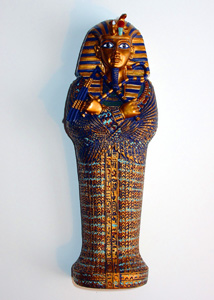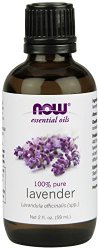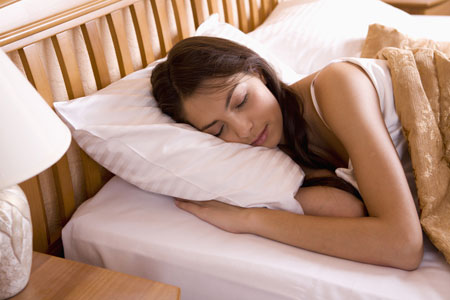What Do Egyptian Mummies, Ancient Roman Baths, and This Herbal Sleep Remedy Have In Common?
First of all, Egyptian mummies were preserved with this herbal sleep remedy (talk about a deep sleep!).

Second, in ancient Rome, the Romans would lounge at bath houses and smear their bodies with the oil of this herb.
And this herbal sleep aid has been the main ingredient in perfumes and soaps for at least 2,000 years.
So what's the herbal sleep remedy I'm talking about?
Lavender (scientific name lavandula angustifolia).
Now, I'm going to assume you're looking for sleep aid tips to fall asleep better rather than wanting to be wrapped in strips of cloth for eternity...or to climb into the tub with 300 Romans and a bar of lavender soap.
Therefore, let's look at the benefits of lavender. That way you can see how this herbal sleep remedy might help you fall asleep naturally and improve your sleep quality.
What is lavender herb used for?
Lavender has been used around the world for centuries as both a medicine and as a cosmetic. Nowadays, lavender is most commonly used for treatments of anxiety, restlessness, depression, and as an herbal sleep remedy for insomnia. English lavender is the most common species of this herb that is used.
A question you might have is "What does depression have to do with sleep?" The answer is this: One thing you may not know is that depression can lead to insomnia and insomnia in turn can lead back to depression. It can become a vicious circle.
Lavender may help offset some of the effects of depression. In one study, the aroma of lavender was shown to have a positive effect on mood and sense of well-being in young men and women.
Another study showed that lavender baths helped with well-being.
And combining lavender tincture with prescription antidepressant medications may be a better combination for fighting depression than the medications alone. (A tincture, in case you don't know, is prepared by soaking leaves, flowers, and other parts of a plant in an alcohol solution. These tinctures typically come in little bottles and most health food stores have a wide variety of different tinctures.)
There is also preliminary evidence from studies that show that lavender aromatherapy may help with chronic pain. Pain can be one cause of insomnia.
How to use lavender as an herbal sleep remedy
Insomnia is the most common type of sleep complaint. Lavender for sleep may help. Research has shown that lavender has a calming and relaxing effect. It also has a sedative effect. These are all important for good sleep.
One study showed that the scent of lavender circulating in the room at night had study participants reporting better sleep. Another study showed that lavender aroma increased slow-wave sleep, a state of deep sleep and relaxation.
A 2005 study in The Journal of Alternative and Complementary Medicine showed that the aroma of lavender was effective as a treatment for mild insomnia.
And for those who suffer from sleep apnea symptoms, a recent study in the January 2010 journal, Chemical Senses, showed that lavender aroma may help with breathing during sleep.
How to take lavender herb

It's really easy to get started using lavender as an herbal sleep remedy. And lavender aromatherapy may be the most effective way to use this herb. Aromatherapy is a therapy that promotes health through the inhalation of the scent from essential oils of flowers and herbs.
All you have to do is put a few drops of lavender oil in a hot bath and soak in it before bedtime. The combination of the warm water, the soothing lavender on the skin, and most importantly, inhaling the lavender oil scent can calm your nerves and relax your mind and body. You might need toothpicks to keep your droopy eyelids open!
Don't have a bath tub? Not a problem.You can make a lavender tea. I just went to my local health food store and sure enough, they had a whole jar of lavender flowers for making tea. Steep a couple teaspoons of the dried flowers in one cup of boiling water. Let it sit for anywhere from 5 to 15 minutes and then drink it. You can do this up to three times a day.
And as I mentioned above, if you don't want tea, lavender tinctures can also be used and have been shown to be effective.
Other ways to use lavender aromatherapy for insomnia
Put a few drops of lavender oil on a handkerchief or tissue and inhale deeply. Feel the stress of your day melt away. Or you can sprinkle a few drops of the oil on your pillowcase, pajamas, or night shirt. Breathing in the aroma throughout the night may keep you sleeping soundly. You can also breathe in the lavender vapors by using a diffuser at night.
And here's an interesting idea: use lavender pillows, specifically in the form of a lavender eye pillow. These pillows are small pouches and are filled with the lavender leaves and flowers. Put one over your eyes and head to dreamland!
Cautions and side effects
Lavender oil should not be taken by mouth! It may be poisonous. Also, some people may develop a mild rash when lavender oil is put on the skin.
You should also be cautious about mixing lavender with sedative medications if you're taking any. The lavender may enhance the effects of the medications in an adverse way.
You also want to make sure that the kind of lavender oil you're buying is for sleep. Some types of lavender have a stimulating effect (Spanish lavender). Ask an herbalist or just look for English lavender.
And finally, the whole point of using lavender as an herbal sleep remedy is so you can be relaxed and drowsy when your head hits the pillow. So don't go driving around...or using a chain saw...after taking lavender for sleep!
Another top-rated herbal sleep aid
|
|
Here Are More Articles You Will Find Helpful
Part 1 of Herbal Sleep Aids: Valerian Root
Part 2: More Herbal Remedies For Insomnia
Part 3: Herbs For Sleep...Hops
Part 4: Sleep Aid Herbs--Secrets To Sleeping Well Using Passionflower
Part 6 of Herbal Sleep Remedies: Chamomile
Return From Lavender Herbal Sleep Remedy To Sleep Disorders Home page










